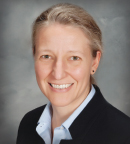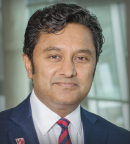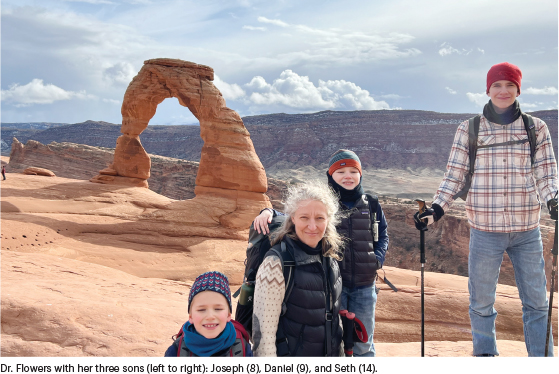In this installment of The ASCO Post’s Global Oncology series, Guest Editor Chandrakanth Are, MBBS, MBA, FRCS, FACS, spoke with Kristin Flowers, MD, a general surgeon at Tanana Valley Clinic at Fairbanks Memorial Hospital in rural Alaska. Dr. Flowers’ surgical areas of interest include treating patients with breast cancer, as well as preventing and treating hernias. She has specific training in oncoplastic surgery techniques, which complement breast cancer treatment.
A Family Based on Service
Dr. Flowers was born in Pennsylvania, but her formative years, until the age of 16, were spent in Africa. “My parents took me to Africa when I was 1 year old, when they served in Kenya, Lesotho and Zimbabwe, and other specific countries in the sub-Saharan part of the continent. My brother and sister were born over there. My father was a bush pilot who flew food, medical supplies, doctors, and patients to refugee camps. That’s how I grew up. It was a rich environment where I learned a lot about life and the world,” she shared.

This is a challenging profession, but we must always remember to do what’s right for patients with cancer, no matter what it takes, because we are their last advocate.— Kristin Flowers, MD
Tweet this quote
Dr. Flowers explained that despite the exotic location, her life in Africa was that of a young girl, living her life, going to school, hanging out with friends, and dreaming of the future. “My father would fly us to places like Victoria Falls, which is a magnificent natural wonder. Most of the countries he flew to were not a place for children and were work-related; some of the locations were unsafe for the general population. My dad would show us slideshows of pictures from his trips. My mom would always be concerned that we’d see too many gory images of who he was helping, because he would show pictures of when he was called upon to help with procedures, including dental procedures such as infected tooth extractions, by the physicians in these remote locations. I was always interested in the ‘gory’ pictures. But his work as a bush pilot was not suitable to take his children along,” she said.
Asked how her early years in Africa helped to shape her view of the world, Dr. Flowers replied: “I think it made me very flexible, very adaptive, and not deterred by things I didn’t understand like languages. I never thought of a different culture or a different language as a deterrent to getting to know someone or learning from somebody. Looking back now, I also benefited from having the opportunity to see that there are other cultures and there’s a lot of other ways to do things; our way is not the only way.”
Returns to the United States, Determined to Become a Doctor
Dr. Flowers moved back with her family to the United States when she was 16. After graduating high school, she entered college for her undergraduate degree in Molecular Biology/premed at Grove City College, Pennsylvania, setting her sights on medical school.
“I always wanted to be a doctor. In fact, I don’t ever remember a time in my life when I ever wanted to be anything else. When I entered college for premed, I had an incredible internship opportunity, serving an Alaskan doctor. My aunt, uncle, and cousins lived in Alaska in the town where the doctor had his practice. My internship was actually extended because I loved where I was. It felt very much like a community I was used to growing up in, so I decided to stay in Delta Junction, Alaska,” she explained.
Dr. Flowers continued: “In Delta Junction, I got a degree in education and taught junior and high school science. I continued working for the doctor, who encouraged me to follow my dream into a career in medicine. He taught me that doctor comes from the Latin word docere, meaning to teach. So, it melded beautifully together for me. And, I met my husband up here in Alaska, and he supported me in pursuing my medical career.”
GUEST EDITOR

Chandrakanth Are, MBBS, MBA, FRCS, FACS
Given that her new husband’s business was in Georgia, Dr. Flowers left Alaska to attend Mercer University School of Medicine in Macon. Upon receiving her medical degree, Dr. Flowers had several considerations when the time came to match. “At that point in time, my parents lived in Seattle. I wanted to get a little closer to them with residency but was also looking for a family-friendly residency. I was thankful to match with the University of Nebraska, in the middle of the country, where I could easily access both East and West coasts,” she commented.
Internship Opportunity Leads to Career Decision
“My husband and I both loved Alaska, but there were not a whole lot of opportunities, when I finished my residency in 2016, so we looked all around. I did some General Surgery locums work in Kentucky, South Dakota, Wyoming, and Oregon. These places were considered rural general surgery opportunities, lacking certain specialties such as Plastic Surgery and Gastroenterology. The job-search experience gave me a broad taste of different environments, and I continued to look for job openings in Alaska. Ultimately, I had a job opportunity at the Tanana Valley Clinic at Fairbanks Memorial Hospital,” said Dr. Flowers. “I’ve been here for almost 4 years now and have been very happy.”
Dr. Flowers credits her decision to become a surgeon to her 8-year, career-shaping internship with a family doctor in Alaska. “The doctor I interned with was terrific about giving me hands-on experience. For instance, he taught me how to stitch up lacerations and care for other trauma wounds. He was great at letting me learn on the job. We even delivered babies in his clinic. We were in a remote rural area, and when I got out to the lower 48, I found family medicine was not the family medicine I’d experienced in Alaska. So, I basically started looking for another area in medicine and fell in love with general surgery.”
Dr. Flowers continued: “I liked the immediate hands-on aspect of surgery. I liked that you had to know the whole patient. I’ve always just thought that the best part of being a doctor was being able to help with your hands as well as with the knowledge we gain.”
A Busy Work Week
Asked to describe a typical work week at Tanana Valley Clinic, Dr. Flowers replied: “I have 4 days of clinical activities and 1 day of administrative duties, which is Friday. I have 2 OR days, Monday and Thursday, and then Tuesday is typically an endoscopy day, but it depends on the anesthesia availability and my caseload. Wednesday is my clinic day. And then I have about a week of call every month, so that routine changes some when I’m on call.”
When the discussion turned to the landscape of breast cancer care in Fairbanks, Dr. Flowers explained that all community providers treat about 80 to 90 patients with breast cancer a year. “Tanana Valley Clinic has a robust breast cancer treatment program, and we are the only center in Alaska that is accredited with the NAPBC [National Accreditation Program for Breast Centers]. We’re very proud of that. We have two medical oncologists in Fairbanks, one radiation oncologist, and a plastic surgeon. We can enter patients into clinical trials through the Western State’s Cancer Research Consortium out of Denver. So, pretty much we’re able to offer standard of care to our patients and almost everything except for intraoperative radiation.”
Unique Challenges in Alaska
Dr. Flowers noted that Alaska’s vastness and socioeconomic issues result in access-to-care challenges. “We just had our survey with the Commission on Cancer, and our mastectomy rates were a little bit higher than the national average, but they were all justifiable when looked at through our specific demographics. For instance, some women make different clinical decisions based on their location and the availability of radiation. Other women who have the means may choose to go out of state for specific care. However, a lot of women in Alaska are no-nonsense, can-do survival people, and they make very practical decisions based on a practical thought process, which I respect,” she related.

Dr. Flowers continued: “Naturally, travel time factors into the decision-making process. We serve the interior of Alaska, which is a lot of remote communities, everything north of Fairbanks and then about 2 to 3 hours from Fairbanks. Anchorage is the biggest city in Alaska, and it’s 6 and a half hours from Fairbanks. So, there are a lot of little communities that are 2 to 4 hours away from both those larger cities, and it certainly exacerbates access challenges when women must travel a long distance and don’t have housing in a town.”
Practice Obstacles Amid the COVID Pandemic
Staffing at rural hospitals during the COVID pandemic presented a challenge if even one or two nurses or doctors needed to be quarantined, so Dr. Are asked Dr. Flowers about her experience during the pandemic. “Dealing with COVID presented a significant challenge, and we worked hard to make sure it didn’t adversely affect our patient care. I’m very proud of how we worked to use tools such as Zoom and virtual pathology to keep patient resources available. The quarantine restrictions did affect some of the breast cancer resource meetings, but our medical oncologists were able to get two negative-pressure rooms, so they were still able to see patients. We also have negative-pressure surgical rooms. One silver lining from the pandemic was we learned that telehealth can also serve as a bridge to connect patients and their clinicians, no matter the distance,” she added.
Closing Thoughts
Dr. Flowers wanted readers of The ASCO Post to be aware that the Alaska Native institutions, along with private institutions, are providing high-quality, robust cancer care in a very large, diverse state, with limited public health and health-care infrastructure. “It takes a shared effort to ensure that appropriate care is available to all residents of Alaska, no matter where they live or what their economic status,” she said. “Lack of access to care, funding limitations, as well as cultural and social barriers are ongoing challenges specific to tribal and rural communities, and through collaborative efforts, we’re making headway for underserved Alaskan populations.”
Dr. Flowers also wanted to share some general thoughts on providing cancer care to patients. “This is a challenging profession, but we must always remember to do what’s right for our patients, including those with cancer, no matter what it takes, because we are their last advocate,” she said. “This far into my career, I’ve learned there are a lot of competing interests in this field, but as physicians, we always must push everything else aside and focus on the individual patient in front of us. I take a lot of pride in sticking to that central medical philosophy and encourage all young doctors to make it their core value. Finally, I must thank you, Chandrakanth, for this wise advice given to me as a resident, when you were my residency surgical director,” concluded Dr. Flowers.
DISCLOSURE: Dr. Flowers reported no conflicts of interest.

